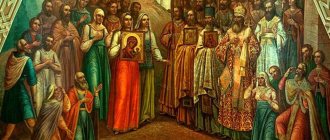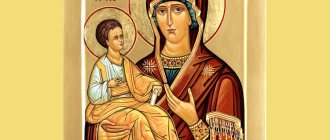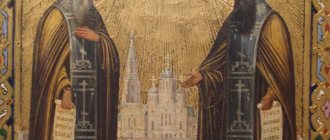Akathist to the Most Holy Theotokos before the icon “Deliverance from the Troubles of the Suffering”
Kontakion 1.
Forbid our enemies to embitter us and separate us from our Lord, and teach us to sing to You cheerfully:
Rejoice, deliverance from the grief, death and troubles of those who suffer us.
Ikos 1.
Many angels, according to Your command, our Mother, are taking up arms for our threatening deliverance, but You accept this prayer:
Rejoice, you who send angels to our salvation; Rejoice, Queen of the high ranks, who gives us their heavenly help.
Rejoice, thou who commandest us as an angel to protect us; Rejoice, thou who destroyest our enemies with the Host of Angels.
Rejoice, deliverance from the grief, death and troubles of those who suffer us.
Kontakion 2.
Seeing so much neediness and such help from Your heart to those who call upon You, they instruct them to sing to Your Son unceasingly: Alleluia.
Ikos 2.
Many people understand that Your Son has given You, Deliverance from the troubles of the afflicted, to those who call upon You:
Rejoice, Mother of the needy; Rejoice, consolation to those who suffer.
Rejoice, hopeless hope; Rejoice, helpless ones.
Rejoice, deliverance from the grief, death and troubles of those who suffer us.
Kontakion 3.
The power of the Most High has been granted by You to help and save the world, which is perishing in troubles, and whoever has been delivered by You sings to Your Son: Alleluia.
Ikos 3.
Having an incomprehensible love for the human race, you did not turn away your tears, and you did not force him to call on You, crying out:
Rejoice, quick hearing for those in need; Rejoice, liberation of the captives.
Rejoice, quick salvation for those who are perishing; Rejoice, consolation for the sad and sorrowful.
Rejoice, deliverance from the grief, death and troubles of those who suffer us.
Kontakion 4.
A storm of misfortunes is upon us. Save us who are perishing, save us, deliverance from the troubles of the afflicted, taming the destructive storm on earth and accepting our song: Alleluia.
Ikos 4.
Hearing humanity give birth to all Your wondrous love for Christians and Your powerful deliverance from all the evil ones who were upon them, learning to sing to You:
Rejoice, deliverance of the human race from troubles; Rejoice, persecutor of despondency.
Rejoice, end of the storms of life; Rejoice, giver of joy through sorrow.
Rejoice, deliverance from the grief, death and troubles of those who suffer us.
Kontakion 5.
Like a godly star, dispelling darkness and obscurity in sin-loving hearts, so that in the light of Your love they will see the Lord and cry out to Him: Alleluia.
Ikos 5.
Seeing the people of Russia Your unexpected deliverance from various troubles, they joyfully sing to the Sice:
Rejoice, O Revenant in our troubles; Rejoice, our sorrows are driven away.
Rejoice, our consolation in sorrows; Rejoice, in joy is our abstinence.
Rejoice, deliverance from the grief, death and troubles of those who suffer us.
Kontakion 6.
They preach Your help and Your love, Mother, all those who are healed, consoled, justified and saved by You from troubles and sing to Your Highly Powerful Son: Alleluia.
Ikos 6.
The light of salvation shone upon us in the darkness of destruction that surrounded us, and I instructed you to sing:
Rejoice, dispelling the darkness of sin; Rejoice, destroyer of the darkness of sin.
Rejoice, enlightening the darkness of my soul; Rejoice, you who encourage my soul with the light of joy.
Rejoice, deliverance from the grief, death and troubles of those who suffer us.
Kontakion 7.
Even though we, in our final despair, would give ourselves up to the troubles that lie ahead, by thinking about You, Deliverance from the troubles of the afflicted, we will be encouraged and consoled, singing to Your Son: Alleluia.
Ikos 7.
You showed us Your mercy in a new and unexpected way, accepting us under Your sovereign hand, and from here we cry out to You:
Rejoice, Queen of Sovereignty; Rejoice, you who have accepted us under Your Power.
Rejoice, Thou who hast given us Thy protection; Rejoice, defeat of our enemies.
Rejoice, deliverance from the grief, death and troubles of those who suffer us.
Kontakion 8.
A strange miracle - those doomed to destruction, languishing in need, countless people suddenly receive salvation and deliverance from You, the All-Loving Mother, singing to God: Alleluia.
Ikos 8.
All who are in the darkness of sorrows, all overwhelmed by the storm of misfortune, come to the good refuge and our help - the protection of the Virgin, Deliverance from the troubles of the afflicted, crying out to Her:
Rejoice, thou who deliverest us from famine; Rejoice, you who drive away harmful nature from the plant world.
Rejoice, you who save crops and forests and everything that grows from destruction; Rejoice, blessed consolation and consolation for mourning farmers.
Rejoice, deliverance from the grief, death and troubles of those who suffer us.
Kontakion 9.
All human beings praise Thee, everyone sings Thee, who brings manifold deliverance to him and, instead of sorrows, gives joy to those who sing: Alleluia.
Ikos 9.
I am distraught and delirious, seeing Your quick, miraculous deliverance from the troubles of the afflicted and silencing us who sing Ty:
Rejoice, you who strengthened us with miracles; Rejoice, thou who hast destroyed troubles through miracles.
Rejoice, you who enlightened us with miracles; Rejoice, who made us glad with Your icon.
Rejoice, deliverance from the grief, death and troubles of those who suffer us.
Kontakion 10.
Though you may save every human soul through your love for it, until you teach it to sing to Your Son: Alleluia.
Ikos 10.
With a wall, guarding the Christian world and protecting every soul from enemies, we will find and manifest Your wondrous image, “Deliverance from the troubles of the afflicted,” may we glorify it, worship and be the father of To your intercession, Mother of God, chanting:
Rejoice, our Redeemer; Rejoice, our mentor.
Rejoice, our joy; Rejoice, our eternal joy.
Rejoice, deliverance from the grief, death and troubles of those who suffer us.
Kontakion 11.
Continuous singing brings You deliverance and You again the joy of having found, They sing joyfully to Your Divine Son: Alleluia.
Ikos 11.
Your icon, “Deliverance from the troubles of the afflicted,” appeared to us as a luminous and radiant luminary in the darkness of sin, and we, sinners, rejoice in having such a wonderful icon of Yours in our temple. for our sake, as a pledge of Your favor to us and to our Abode, and trusting in Your motherly prayers and hearing them quickly, touchingly with the verb:
Rejoice, source of joys; Rejoice, drive away sorrows.
Rejoice, troubles have diminished; Rejoice, giver of all peace.
Rejoice, deliverance from the grief, death and troubles of those who suffer us.
Kontakion 12.
The grace from Your icon, “Deliverance from the troubles of the afflicted,” flowing, abundantly supplying streams of healing and enlivening hearts with joy, encourages everyone to sing with their free will about You, Mother, Your Son to him and to God: Alleluia.
Ikos 12.
We sing Your icons’ wondrous renewal, we sing Your merciful charity towards us sinners and, chanting, we sing:
Rejoice, you who take away from death and eternal fire; Rejoice, you who raise the dead.
Rejoice, our dying hope and protection; Rejoice, after death we have peace.
Rejoice, deliverance from the grief, death and troubles of those who suffer us.
Kontakion 13.
Oh, our All-Singing, All-loving Mother, be merciful now and have mercy on us, in our cruel and hopeless troubles, to the only being who delivers us, and teach us to sing to God with our hearts, to the one who saves us: Alleluia.
This kontakion is read three times, then the 1st ikos and the 1st kontakion.
Ikos 1.
Many angels, according to Your command, our Mother, are taking up arms for our threatening deliverance, but You accept this prayer:
Rejoice, you who send angels to our salvation; Rejoice, Queen of the high ranks, who gives us their heavenly help.
Rejoice, thou who commandest us as an angel to protect us; Rejoice, thou who destroyest our enemies with the Host of Angels.
Rejoice, deliverance from the grief, death and troubles of those who suffer us.
Kontakion 1.
Forbid our enemies to embitter us and separate us from our Lord, and teach us to sing to You cheerfully:
Rejoice, deliverance from the grief, death and troubles of those who suffer us.
Prayer.
Mother of God, help and protection! Whenever we require, be a deliverance to us, those suffering and perishing from cruel troubles, we trust in You and always call upon You with all our souls: have mercy and help, have pity and deliver the suffering from the troubles and snatch us who are perishing from the cruel snares of the evil one; incline Your ear, and ours Accept tearful, sorrowful prayers and, as you wish, give us peace and joy. Teach to obey the Lord God, to love Your Son with all your heart, with all your soul, with all your being, to bring the fruits of your labors worthy of Him. Calm our hearts, so that in one Spirit and with all our deeds we will glorify the Beginningless Father with His Only Begotten Son and with the Most Holy Good and His Life-giving Spirit, and Your merciful Mother will appear ministry, now and forever and to the ages of ages. Amen.
History of appearance
The text of the akathist “Redeemer from the Sorrow of Suffering” is intended for prayerful appeal to the icon of the Most Holy Theotokos “Redeemer”. The history of this icon goes back several centuries.
The first appearance of the sacred image has been known since 1841. The owner of the icon was one of the monks of the Athos monastery, Martinian. The icon became famous after the saint’s prayers before the face for the deliverance of the harvest from an invasion of locusts.
The story of saving people from hunger spread throughout the Greek province, and people began to go to the elder to pray before the miraculous image. After the death of Martinian, by the will of the elder, the icon was transported to the Russian monastery on New Athos.
The face of the Virgin Mary saved the life of Alexander III and his family during a train disaster in which they were returning from vacation. In honor of the extraordinary salvation of the royal family, a celebration of the holy image was established, which fell on October 30 according to the new style.
The second appearance of the Liberator occurred in October 1917. This time, the Mother of God appeared in a dream to a resident of the village of Tashla, Samara region, Ekaterina. The girl was told the burial place of the icon.
Catherine, together with her friends, actually managed to find the icon in the indicated place, where the spring later flowed out. Another of the lists of the Redeemer is in the monastery of St. Nicholas, where it was brought in 1997 by two residents of Arzamas.
Initially, the image on it was unclear, covered with black soot. But gradually the blackened table miraculously began to glow, and the faces of the Virgin Mary and Jesus appeared on it. From the inscription, which was soon removed, it became clear that this was an image of the “Deliverer from Trouble.”
Since then, the priests of the monastery have read Akatist to the Redeemer weekly. And miracles that occur through the prayers of those suffering are recorded in a special church book.
Meaning in Orthodoxy
The icon “Deliverer from Troubles,” to which the akathist is dedicated, is one of the most significant for Orthodox Christians.
Each detail of the image of the Mother of God depicted on the icon has a specific meaning:
- The red veil (maforium) and blue tunic speak of the royal grandeur and virgin purity of the Mother of God.
- The gilding on Christ's robe indicates God's grace and holiness.
- The scroll that the Baby holds in his hands symbolizes the Old Testament.
- The golden frame of the miraculous icon is a symbol of Divine light.
The Akathist text describes the miracles that occurred after prayers near the sacred image.
Many believers, praying to the Intercessor, received healing from physical and mental illnesses. Holy Mother of God:
- help people keep faith in their hearts,
- instructs sinners who cannot walk the right path on their own,
- relieves alcohol intoxication, fever, eye diseases;
- helps preserve marriage;
- treats children;
- protects those who need it.
The enormous power of the prayer hymn dedicated to the Blessed Virgin Mary is based on people’s faith in God. The intercessor is ready to provide his heavenly attention and protection to any Orthodox Christian who believes in omnipotence and love. To the one who forgives everything about the Lord.
How to read correctly
They usually resort to reading Akatista if they need help with something very important. The prayer hymn can be read once or read over several days. When reading extensively, it is advisable to turn to the priest for a blessing.
The priest will tell you how many days you need to read the text of the eulogy. Usually it takes 40 days. But when making such a decision, you need to take into account that reading should take place daily, without interruption.
The Akathist can be read in church or at home on your own. Like all prayer hymns, the recitation of Akatista the Liberator is preceded by some prayers:
- preliminary;
- "Trizon";
- "Our Father";
- "Glory even now."
It is best to read the prayer hymn in the morning, while your thoughts are not occupied with everyday worries. If a person does not have health problems, a prayer service is read while standing.
It is better if the image of the Mother of God is before your eyes. But this does not mean that help comes from the image of the Mother of God; one must turn not to the icon, but to the Most Holy Intercessor.
Prayer does not have to be formal. An akathist is not a magical ritual that satisfies any request.
To receive the help of the Mother of God, you need not only to pray in front of the holy image, but also to participate in the life of the church, attend services and lead a righteous lifestyle.
Don’t forget that the akatist is not only a prayer, but also a song of praise. Therefore, it can be performed as a sign of gratitude to the Redeemer.




